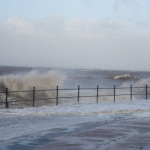Storm force winds coupled with a very high tide at lunchtime struck the Hoylake coastline today.
North Parade was closed to traffic as sea water and debris reached the garden walls of houses facing the beach (though a few cars were driving along). It appears that Hoylake got off lightly compared to West Kirby and especially New Brighton. Hoylake’s pirate ship The Grace Darling survived pretty much but The Black Pearl at New Brighton is sadly no longer.
Chris Williams and Vaughan Williams both captured the damage to the promenade at Sandhey slipway with this photo from Chris clearly showing the repairs that’ll soon be required:
Ian Hazelhurst has created a video of today’s high tide and here are some more, large images (when clicked) of the promenade today:











As climate change increases the likelihood of more of this type of event, then maybe better natural defences to bolster the man-made ones would be a good idea. Sand dunes that might evolve if the grass wasn’t sprayed? – just a thought …
OMG! They’re actually killing the marrom grass that’s needed to stabilise the sand dunes? Because people prefer sandy beaches? That’s nonsense – the dunes are the first line of defence. If people don’t understand the importance of stabilisation, then educate them! Put a sign up!!! Hoylake’s fantastic – dunes and grass don’t spoil a beach – dog mess and litter do! Half of Hoylake might be washed away at this rate!
Letting the grass grow won’t suddenly create sand dunes. Southport and Parkgate have grass on their beaches but no dunes.
Hoylake’s sand dunes, despite being covered in tarmac and concrete, helped reduce the impact of December 5th’s storm surge. Without their profile, the seawater would have travelled further up the likes of Lake and Government Roads. True, there is no guarantee of additional sand dunes developing in front of the seawall, but we have to shake off the status quo mindset, and be receptive to new ideas. Working with nature usually results in less destruction in the long run.
We’re very fortunate that we have so many local people with so much knowledge on ecology?